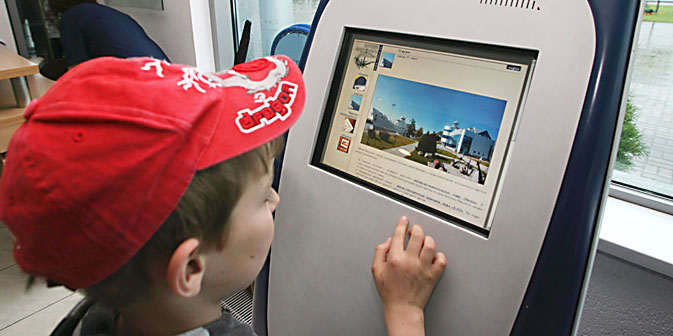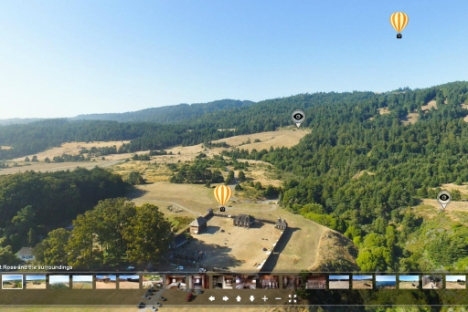
Source: Igor Zarembo / RIA Novosti
From January 27 to May 18, the State Museum of the History of Religion in St. Petersburg hosted the First “Museum Geek” Internet Festival of Museum Multimedia. Want to know more about Russian history but can’t afford to take a long journey? Don’t worry. The organizers of the festival believe that soon, the only thing you’ll have to do is click a few buttons on your computer screen.
“The festival is an action research project, a way to get acquainted with museum multimedia developers and their work and to establish an informal professional dialogue,” says Olga Kissel, one of the festival’s organizers, who have been involved in museum multimedia development for over 20 years and work with the most cutting-edge museum technologies, including virtual tours, mobile applications, and educational programs.
“It was difficult to get the ball rolling at first, to interest museums in the project and get responses,” Kissel confesses. But they managed; a total of 70 projects from 43 museums all over the country took part in the contest.
Jury members and festival visitors were supposed to settle on a winner by May 18. First place went to the online game Museum Encounter, developed by the Semenkovo Museum, a division of the Architectural and Ethnological Museum of the Vologda Region. The program, which received around 2,000 votes at the festival, is designed for people who are interested in the folk culture of Russia’s northern villages (Russian version only).
The museum competition was confined to the internet, with participants voting for their favorite project online. A jury headed by Mikhail Piotrovsky, the director of the State Hermitage Museum, selected the winners for each category. There were a total of five nomination categories: digital collections, programs for people with special needs, exhibition multimedia, educational programs, and museum advertising and PR (complete list available here).
Collaborations with museums from other countries were more than welcome. The Peterhof Museum, for example, prepared a collaborative project with the Palace of Versailles: a thematic website called Peter the Great’s Journey to the Chateau du Versailles in 1717 (in Russian, English and French).
The website presents a number of interesting historical facts – why Peter the Great had to bend down in order to speak with the French king, why he had to live in a simple town house instead of at the Louvre – in a lively, fascinating format that spans the whole era, instead of using a static list of historical facts.
The project called “Vologdians in the History of Russian America,” put together by the Vologda State Museum-Preserve, is also flawless in terms of content and technical features (in English and Russian). Interest in this project has a historical precedent: In 1812, Russian explorers from Vologda founded Fort Ross in California.

The project presents museum interiors and objects in the
context of hundreds of specially designed panoramas and photographs. Source: Press photo
“It was the Russian North that supplied a significant number of pioneers to Siberia, the Far East, and the Pacific coasts of Europe and North America in the 17th-19th centuries,” says General Director of the Vologda State Museum-Preserve, Alexander Suvorov. “The founder and first head of Fort Ross in California was Ivan Kuskov, a Totma native who served in the Russian-American company.”
The project presents museum interiors and objects in the context of hundreds of specially designed panoramas and photographs. “We combined resources from five museum associations in four different locations across two continents. In this sense, the project is unique. The employees of Fort Ross Park in California really liked the project. The posted it on their website and came to visit us in Vologda,” Suvorov says.
However, the Museum Geek Festival does not solely focus on international projects. The Yasnaya Polyana Leo Tolstoy Museum presented an expanded version of the mobile application called “The Cookbook of Sophia Andreyevna Tolstoy” to the public and the festival jury. The application unveils the secrets of Russian and European cuisine preferred by noble families during the second half of the 19th century.
According to Kissel, the organizers have achieved their goal. “The idea turned out to be very productive. It attracted public interest, and people were enthusiastic about it. The voting process was very competitive, and we received quite a bit of praise for ‘reviving the museum community.’”
All rights reserved by Rossiyskaya Gazeta.
Subscribe
to our newsletter!
Get the week's best stories straight to your inbox